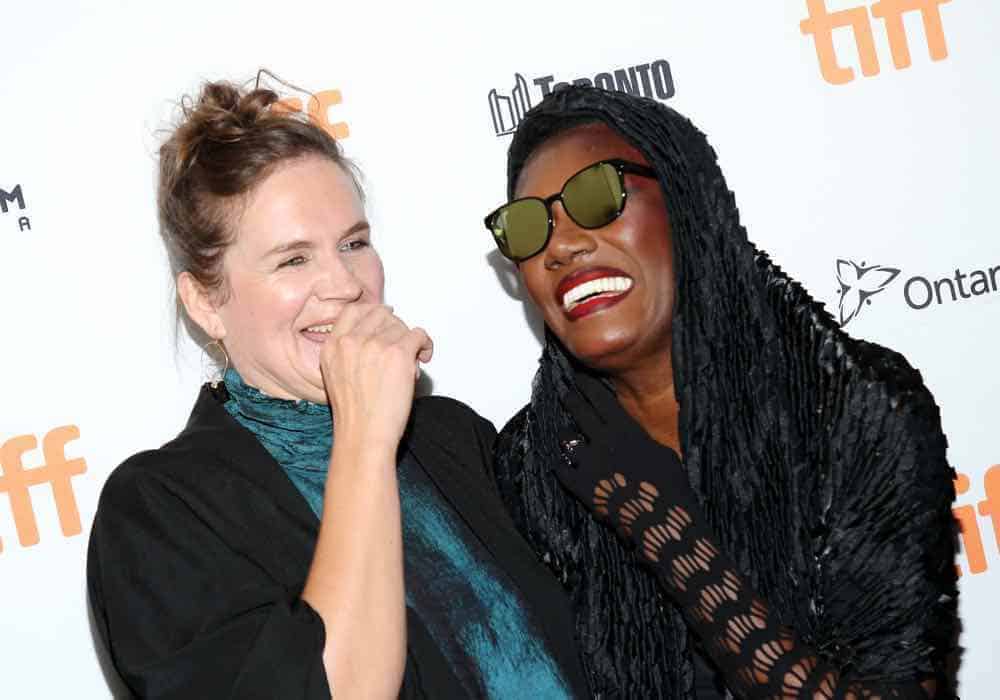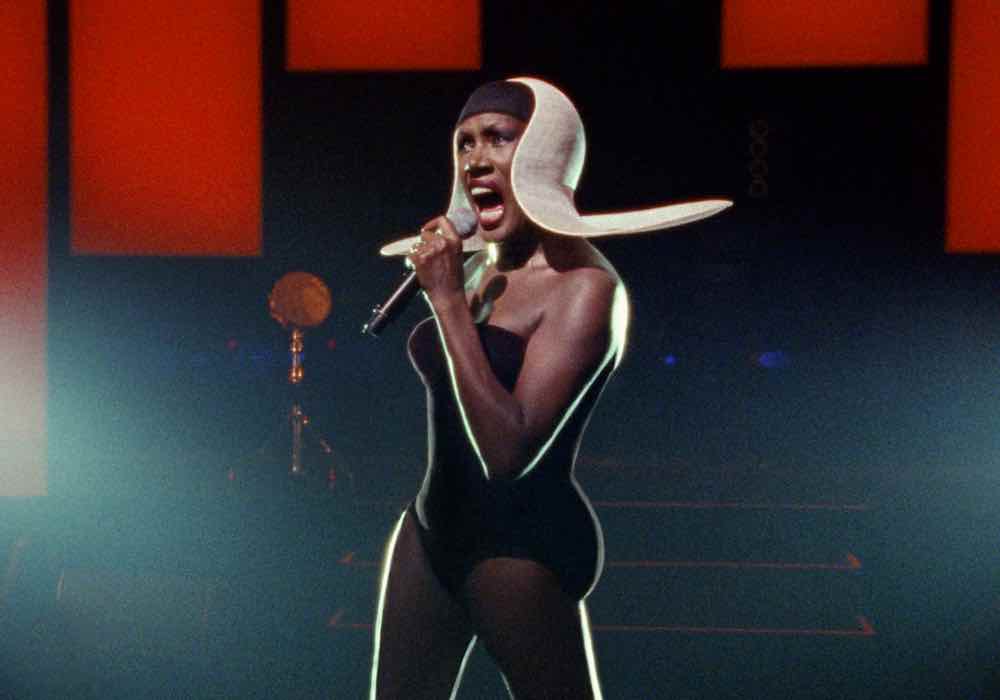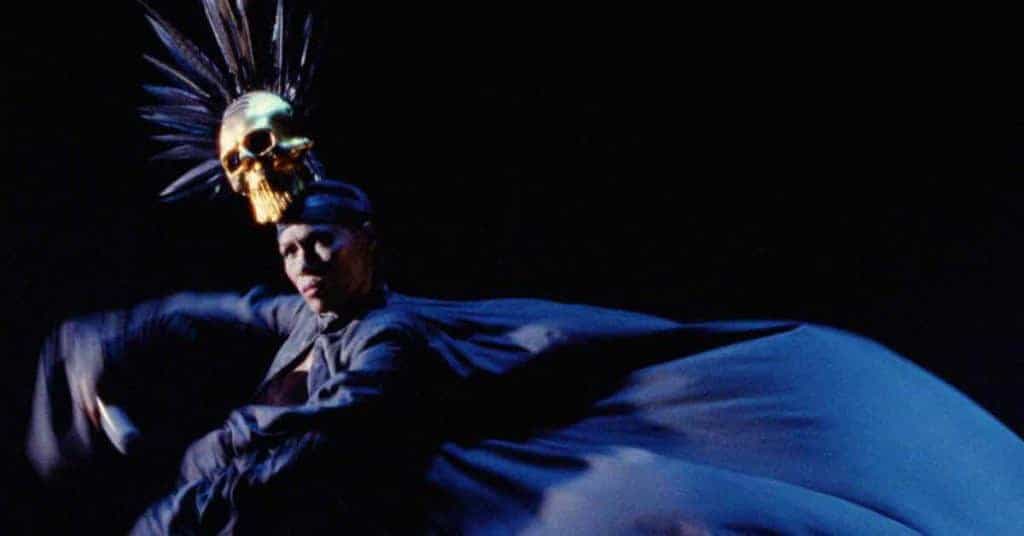In this excerpt from the ebook In Their Own Words: Documentary Masters Vol. 1, Director Sophie Fiennes discusses the making of Grace Jones: Bloodlight and Bami and the importance of performativity. To read the whole interview, purchase the ebook here.

English director Sophie Fiennes became a truly recognisable name after her two very popular, playful yet rigorous essay films on Slovene philosopher Slavoj Zizek. Five years later, she delights again with a documentary much less stylised than her previous work, but just as vibrant.
Filmed over a the course of a decade, Grace Jones: Bloodlight and Bami offers an all-access look into the life of the international star of ‘La Vie en Rose’ — the 1977 bossa nova version. From hotel rooms to television appearances, from the singer’s native Jamaica to nightclubs all over the world, Fiennes’ documentary follows Jones everywhere and with the same hunger, assurance, and energy as the now 69-year-old icon. The film is a fun, thrilling, and inspiring collaboration between two women who completely understand and respect each other — as friends, artists, and women.
The Seventh Row caught up with Sophie Fiennes in Toronto to discuss her process, working with great quantities of footage spread over several years, performativity, trust, and being “a high-flying bitch.”
Seventh Row (7R): How did this project come about?
Sophie Fiennes (SF): I met Grace, and she’d seen this film I’d made about her brother, Noel Jones [Hoover Street Revival (2002)]. On the basis of that, we just decided to start something together. We didn’t quite know what would be in it. When you’re making a documentary, you don’t know what’s going to happen. She’d call me saying, “I’m going here. I’m going there. Come with me to Jamaica!” I was just always ready to go. I kept collecting the evidence, as I say. I was doing other films, but I would go anyway.
It got to a point where I thought, “I’ve now got quite a range of material, but I need a performance.” That was crucial. When I was filming the documentary material, the Grace Jones band didn’t exist yet. Now, they tour everywhere together, and they’re really tight. They’ve got that ensemble understanding of each other on stage. That was one bit that we didn’t have to invent for the film, because it already existed. But the art directed performance didn’t. We had to create that.

Photo courtesy of Sligoville Limited, Blinder Films Limited, The British Film Institute, British Broadcasting Corporation
7R: So the performance we see in the film was created for the film?
SF: Yes. Last year.
7R: Is that the performance she is doing on stage these days?
SF: No. It’s very likely that no one will ever see that performance outside the film.
To read the rest of the interview with Sophie Fiennes, purchase a copy of the ebook In Their Own Words: Documentary Masters Vol. 1 here.
[wcm_restrict]
7R: How was it to work over such a long period of time? How did you get your mind around all that footage?
SF: After four years, I knew that if I kept on shooting, I would just get lost. The clarity would get lost. Because the footage I had actually documented a specific moment around the creation of Hurricane [Jones’ tenth studio album, released in 2008, and her first album of new material in 19 years]. That was also when she became a grandmother and lost her father. She was on a transgenerational journey where she wanted to explore Jamaica. It was all one specific period of her life.
I literally put the footage in a box and was doing other projects where the finance came in. She’d said to me, “I’m not in any hurry.” I thought that might mean she was not ready for it to be actually completed. So I waited until it felt like the right moment. It’s not like you can snap your fingers and the film will be made. It took a year just to do the paperwork for the business affairs end of things. I wasn’t willing to edit until I knew that that was all locked down. I just had to know that I could create that theatrical performance. I wouldn’t have known how to shape the footage without it.
I created a kind of rough shape of the edit, thinking about where the performances would go. I would decide which songs to include. I really wanted “Nipple to the Bottle” because it brings out this kind of angry, resistant, brilliant part of her. “William’s Blood” is biographical: It speaks to the story of her childhood and why she is the way she is — she’s got the Williams’ blood, but equally, she’s got those traits of a Jones, too. Jones never come second; they always come first, as the mother says in the film.
[clickToTweet tweet=”‘She’s always playing with the moment…Actually, we are all performing, all the time.’ – Sophie Fiennes” quote=”‘She’s always playing with the moment…Actually, we are all performing, all the time.’ – Sophie Fiennes”]
It’s only when I really cut the film that I realised that she’s always playing with what she is: “You have to be a high-flying bitch;” “I’m human;” “We’re going tribal;” “You make me look like a lesbian madame in a brothel.” She’s always playing with the moment. That’s that performative part of her. Actually, we are all performing, all the time.
7R: But she does it better, because she knows she’s doing it.
SF: Yes! Well, exactly. You’re right. But I think we’re all performing. We have to perform. You go to school; you’re told to wear a uniform or not. If you don’t wear a uniform, the question is,”‘What performance will each child do? Will there be some kind of competition?” Particularly, when it comes to women: it’s an inventive thing being a woman. It’s a creative thing.
[clickToTweet tweet=”‘It’s an inventive thing being a woman. It’s a creative thing.’ – Sophie Fiennes” quote=”‘It’s an inventive thing being a woman. It’s a creative thing.’ – Sophie Fiennes”]
That’s why we have fashion — that playful, creative thing you can do as a woman, and which is not about attracting a man, necessarily! I always love Comme des Garçons, and I know that this is not at all exciting for men. But I don’t care! Because I love playing games with Rei Kawakubo’s designs. The different things they allow you to do and be. That performativity is key to the female life, culturally.
[clickToTweet tweet=”‘Performativity is key to the female life, culturally.’ – Sophie Fiennes” quote=”‘Performativity is key to the female life, culturally.’ – Sophie Fiennes”]
7R: The film is not at all into mythmaking. It doesn’t make her look mysterious — on the contrary. Because of the incredible access you have to her, we know that she is the myth, 24 hours of the day. Were you always going to have this sort of access?
SF: No, that came from the fact that she said, “Let’s do something together. I’m making an album. Come to the the studio.” In the studio, you can see the producer looking at his computer, and I was behind the camera making faces to her. We were sort of playing. I was encouraging her. I would say to her, “Do you want me to leave the room?” and she would say, “Well, we are performers. We like an audience!” We had this complicity, from one woman to another.
[clickToTweet tweet=”Grace Jones ‘would say, ‘Well, we are performers. We like an audience!'” quote=”Grace Jones ‘would say, ‘Well, we are performers. We like an audience!'”]
It reminded me actually with my older sister, we used to play and do fashion shows at home. I did a bit of modelling, actually, when I was really young. We used to play with photography, just like that! It was funny when I read in an interview that Grace said, “Sophie is like a sister,” because it’s just the same feeling of playing.
I didn’t have that anxiety where I wondered, “What am I going to say about Grace Jones?” I just had to respond to those moments while filming, and let the footage speaks for itself. When you assess your footage over four years, you discover what it can do. I couldn’t think it in a linear way. This is the brilliance of working in non-linear editing. You find relationships between various elements that do not necessarily follow each other directly. You can play with it, and suddenly, it tells you what it can do. You can feel where it can hit.
7R: There are moments of nudity, or moments where Grace is shouting on the phone: this is not the type of footage we usually find in documentaries, because it might make her look difficult.
SF: That was her decision. That’s her utter brilliance. To give herself over to this, to not try to control it, to trust me. And that trust pays off. Every subject should know that you will be seen for what you don’t show, more than what you show: you’ll be seen to be hiding. She made that decision to be completely seen. That was so cool of her.
[clickToTweet tweet=”‘Every subject should know that you will be seen for what you don’t show, more than what you show.’ – Sophie Fiennes” quote=”‘Every subject should know that you will be seen for what you don’t show, more than what you show.'”]
7R: Did she have any say in what you were going to do?
SF: She would always say, “Oh no, honey! You carry on! Work away!” She was completely encouraging. She never attempted to control me. Even in the edit, she didn’t want to look at the footage. I showed her a rough cut of the film, and she had some great points — but only a couple. Then, I pretty much finished the film, and she looked at it again. She said she still loved it, but just wanted to change two, tiny things to do with rhythm. They were really minor changes, but they were great, and made a huge difference.

7R: In the film, she quotes, “Sometimes, you have to be a high-flying bitch” from Dolores Claiborne (1995), which is such a niche reference. She seems to love movies.
SF: Yes, she loves watching films. For her performance, in terms of camerawork, I was thinking of Rita Hayworth in Gilda, when she signs the song “Amado Mio.” She does this sort of duet with the camera — she comes towards it, then away — it’s amazing. She was a brilliant dancer. I love dance. I’ve worked with dancers. I’ve made films about dance, so I was just bringing all of that into how to capture the performance.
I wanted to be able to see her body without the monitors cutting off her feet; to make a clean place and light it so that you could have that classic silhouette, almost like a Hollywood noir. It smells a little bit of this kind of cinematic space of burlesque, of theater, of cabaret. I wanted to create this intimacy with the audience.
[clickToTweet tweet=”‘It smells a little bit of this kind of cinematic space of burlesque, of theater, of cabaret.’ -Sophie Fiennes ” quote=”‘It smells a little bit of this kind of cinematic space of burlesque, theater, cabaret.’ -Sophie Fiennes “]
7R: Did the film change as you got to know Grace Jones better?
SF: By the time I was editing, I knew her very well. I knew how she felt about things. It informed the way I made decisions, probably, in lots of ways that I’m not even conscious of. But certainly, a lot of what she thought about performance informed how I created the performance material.
[clickToTweet tweet=”‘A lot of what she thought about performance informed how I created the performance material.’ – Fiennes” quote=”‘A lot of what she thought about performance informed how I created the performance material.’ – Fiennes”]
The things that informed my selection were also realising that she does love looking at the sunset and the sunrise. She was taking all these photographs. I wanted to create a sense that, of course, this is someone who is looked at, but you would see her as the person looking. I tried to get inside her point of view, her visual aesthetic, her pleasure —whether it’s the pleasure of sucking the coconut, or that of admiring the view.
[clickToTweet tweet=”‘I tried to get inside her point of view, her visual aesthetic, her pleasure.’ – Sophie Fiennes” quote=”‘I tried to get inside her point of view, her visual aesthetic, her pleasure.’ – Sophie Fiennes”]
This sensuality is a big part of her: she loves food, and her birthplace of Jamaica has this quality as the place where her senses first developed. As a child growing up there, her sense were awakened by this tropical island — its sun, its fruits, its food. The place is definitely much more built up now, but it retains that quality. I tried to communicate her sensuality with the way she’s eating oysters, or picking the fish off the fish head — these kinds of consuming pleasures.
[clickToTweet tweet=”‘I tried to communicate her sensuality with the way she’s eating oysters, or picking the fish off the fish head.'” quote=”‘I tried to communicate her sensuality with the way she’s eating oysters, or picking the fish off the fish head.'”]
7R: This appetite and desire for contact goes with how she seems to be the one in control even when she is being looked at.
SF: That’s, again, something I was interested in — this relationship between passive and active. Even though he [Jean-Paul Goude, French photographer, ex-partner of Jones who often collaborated with her on her work] is photographing her, and she’s in a rather passive space, she’s active always. The same goes for when I’m filming her. It’s hard to film her without her talking, actually.
[clickToTweet tweet=”‘Being a bitch is not necessarily what you’re actually doing, but how you’re perceived.'” quote=”‘Being a bitch is not necessarily what you’re actually doing, but how you’re perceived.'”]
7R: Do you agree that “sometimes, you have to be a high-flying bitch to survive?”
SF: I think the key to that line is the humour with which she says it. It’s funny how that line has been so picked up… I was reading an interview she’d done with Variety, and she said, “You know, if you’re a strong man, you’re a professional. If you’re like that but you’re a woman, you’re a bitch.”
[clickToTweet tweet=”‘Grace isn’t a bitch. She just knows what she needs to deliver her performance.’ -Sophie Fiennes” quote=”‘Grace isn’t a bitch. She just knows what she needs to be able to deliver her performance.’ -Sophie Fiennes”]
What constitutes being a bitch is not necessarily what you’re actually doing, but how you’re perceived. And funnily enough, Grace isn’t a bitch. She just knows what she needs to be able to deliver her performance. In the film, before she goes on stage, the adrenaline is building. She has to get into that fierce state of mind. So she goes, “Shut the fuck up! You didn’t have the cars for us!” And it’s true! She has a point.
Read all of The Seventh Row’s TIFF reviews and interviews >>
[/wcm_restrict]

